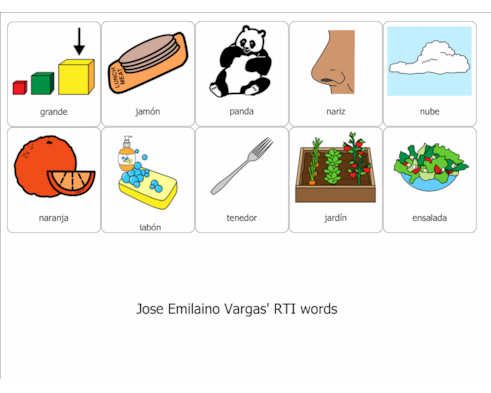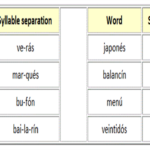Spanish Words That Start With The Letter N
1. Nariz (nose)
2. Naranja (orange)
3. Novio (boyfriend)
4. Nube (cloud)
5. Noche (night)
6. Nombre (name)
7. Niño (child)
8. Negro (black)
9. Natación (swimming)
10. Nacimiento (birth)
11. Navidad (Christmas)
12. Nido (nest)
13. Noticia (news)
14. Novedad (novelty)
15. Neumático (tire)
16. Número (number)
17. Nota (note)
18. Nostalgia (nostalgia)
19. Nylon (nylon)
20. Nueve (nine)
21. Nacionalidad (nationality)
22. Nervioso (nervous)
23. Naturaleza (nature)
24. Nochevieja (New Year’s Eve)
25. Nave (ship)
26. Novela (novel)
27. Nómada (nomad)
28. Nutrición (nutrition)
29. Noventa (ninety)
30. Narciso (narcissus)
More About Spanish Words That Start With The Letter N
Welcome to my blog, where we dive into the captivating world of Spanish vocabulary! In this edition, we embark on a delightful journey exploring a selection of words that begin with the letter “N.” As we unravel the linguistic treasures associated with this letter, get ready to expand your vocabulary, deepen your cultural understanding, and enhance your fluency in the Spanish language.
Spanish, as a Romance language, draws influences from Latin, Arabic, and various regional dialects. Its richness lies not only in its poetic nature but also in its diverse vocabulary. Words that commence with “N” in Spanish open the door to a spellbinding array of connections, allowing us to glimpse into the language’s historical and cultural roots.
Our exploration begins with an essential concept in both language and communication: the noun. Understanding the function and significance of nouns in any language is crucial for grasping the structure and context of sentences. In Spanish, nouns that start with “N” are no exception, carrying their unique flavors and meanings. From “nombre” (name) to “naturaleza” (nature) and “nación” (nation), nouns commencing with “N” convey a sense of identity, presence, and belonging.
As we delve into descriptive words, we discover the power of adjectives in painting vivid images in our minds. Spanish adjectives beginning with “N” present us with an intriguing blend of characteristics that highlight the beauty and complexity of the language. Whether we encounter words like “noble” (noble) or “numeroso” (numerous), each adjective unravels a specific aspect of the subject at hand, evoking emotions and defining its essence in a unique manner.
Moving beyond nouns and adjectives, our exploration would be incomplete without diving into verbs. Verbs are the engines that propel our thoughts into actions. Beginning with “N,” Spanish verbs play a vital role in capturing the nuances of actions and experiences. From “nacer” (to be born) to “navegar” (to navigate) and “notar” (to notice), these verbs invite us to embrace the language’s vibrant energy and express ourselves with precision and eloquence.
To grasp the intricacies of Spanish, we must also venture into the realm of adverbs, where words with intangible yet influential powers reside. Spanish adverbs commencing with “N” enrich our sentences by providing information about how, where, or when an action takes place. Whether it’s “necesariamente” (necessarily), which denotes an essential condition, or “naturalmente” (naturally), a term that underscores the organic development of events, adverbs beginning with “N” contribute to the fluidity and expressiveness of the language.
Beyond the quintessential parts of speech, Spanish vocabulary starting with “N” encompasses terms that shed light on culture, geography, and everyday life. Be prepared to explore words like “nacionalidad” (nationality), “negocios” (business), and “nuez” (nut), as they add depth to our understanding of Spanish-speaking countries, their customs, and their culinary delights.
As we conclude this introduction, I invite you not only to read and learn from these words but also to embrace the beauty and rhythm of the Spanish language. With each word we encounter, we enhance our ability to express ourselves, connect with others, and embark on unforgettable journeys through diverse cultures.
Stay tuned for an immersion into Spanish vocabulary, and let the words that commence with “N” be our gateway to a truly enriching linguistic experience. ¡Comencemos esta apasionante aventura! (Let’s embark on this thrilling adventure!)
Spanish Words That Start With The Letter N FAQs:
1. ¿Qué significa la palabra “naranja”?
La palabra “naranja” significa una fruta cítrica de color naranja.
2. ¿Cuál es la traducción de la palabra “noche” al inglés?
La traducción de la palabra “noche” al inglés es “night”.
3. ¿Cómo se pronuncia la palabra “nombre” en español?
La palabra “nombre” se pronuncia como “nom-breh”.
4. ¿Cuántas sílabas tiene la palabra “nuevo”?
La palabra “nuevo” tiene dos sílabas: nue-vo.
5. ¿Cuál es el significado de la palabra “niño”?
La palabra “niño” significa un niño o un joven (masculino).
6. ¿Qué es una “navaja” en español?
Una “navaja” es un cuchillo o una herramienta de corte plegable.
7. ¿Cuántos países de habla hispana comienzan con la letra “n”?
Dos países de habla hispana comienzan con la letra “n”: Nicaragua y Nauru.
8. ¿Qué significa la expresión “no hay problema”?
La expresión “no hay problema” significa que no hay ningún inconveniente o dificultad.
9. ¿Cuál es la diferencia entre las palabras “nada” y “nadie”?
La palabra “nada” significa “nothing” en inglés, mientras que “nadie” significa “nobody”.
10. ¿Cuál es la raíz de la palabra “naturaleza”?
La raíz de la palabra “naturaleza” es “natura”, que proviene del latín y significa “naturaleza” en español.

















